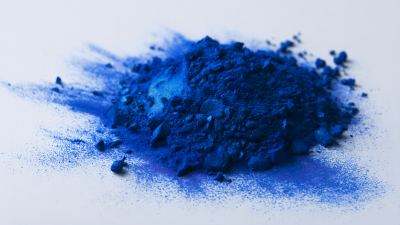The innovative coating industries are at the forefront of a transformative movement aimed at achieving sustainability through significant waste reduction. According to a recent report by the Global Coating Industry Association, these industries have successfully implemented advanced technologies and sustainable practices that have led to a reduction of up to 30% in waste production compared to traditional methods. This shift not only minimizes environmental impact but also enhances operational efficiency and product quality. By adopting eco-friendly materials and innovative application techniques, these companies are setting new industry standards and demonstrating that sustainability and profitability can go hand in hand. As consumers increasingly demand greener options, the innovative coating industries are not just evolving; they are pioneering a future where responsible manufacturing is integral to their business models.

The modern industrial landscape is increasingly recognizing the importance of sustainable coating solutions, particularly in light of evolving environmental standards and consumer expectations. A recent report from the International Coating Association indicates that industries are moving towards eco-friendly practices, with sustainable coatings projected to grow by 20% annually through 2025. Such solutions are not only effective in minimizing environmental impact but also in extending the life cycle of products—reducing the need for frequent repaints or replacements.
Emerging technologies in the coating industry have made it possible to achieve high-performance results while significantly reducing waste and emissions. For instance, innovative formulations that utilize bio-based materials can lead to a reduction of up to 30% in waste during production. Furthermore, the adoption of water-based coatings instead of traditional solvents has proven beneficial, offering not only a decrease in harmful volatile organic compounds (VOCs) but also better adherence to stringent regulatory measures. This trend underscores the importance of integrating sustainability into coating technologies, aligning them with global efforts to minimize ecological footprints and enhance overall environmental stewardship.
The innovative coating industries are making significant strides towards sustainability by developing materials that not only reduce waste but also extend the longevity of products. According to a recent report by the American Coatings Association, nearly 30% of waste can be eliminated through the use of advanced coating technologies. These innovations focus on creating durable, high-performance coatings that resist wear and tear, thereby extending the life cycle of various products, from automotive to consumer goods.
One key advancement involves the use of bio-based materials, which significantly lower the environmental impact compared to traditional petrochemical alternatives. For instance, coatings derived from renewable sources can reduce carbon footprints by up to 50%, according to a study published in the Journal of Coating Technology and Research. Additionally, innovations in application processes, such as electrostatic spraying and digital printing, further minimize waste by ensuring more precise coating applications.
Tips: When considering new coating options, always inquire about the materials' sustainability ratings and their potential for waste reduction. Additionally, look for products with extended warranties, as they often indicate better durability and longevity. Finally, educate your team on proper application techniques, as this can dramatically impact both performance and waste generation.
The coating application process has been undergoing significant transformation, particularly by adopting eco-friendly practices that minimize waste. Companies in the innovative coating industry are leveraging advanced technologies and sustainable materials to reduce environmental impact, achieving up to 30% less waste in their operations. The shift toward green coatings is not only a response to regulatory pressures but also a market-driven initiative, as consumers increasingly prioritize sustainability in their purchasing decisions.
One major area of innovation within this space involves the use of alternative materials and practices for coating synthesis. For instance, the adoption of water-borne and powder coatings has become prevalent due to their lower environmental footprints. Additionally, advancements in polymer technologies are enhancing the durability and performance of these eco-friendly products. Companies are also exploring the use of agri-food waste extracts for the synthesis of metallic nanoparticles, integrating waste valorization into their production processes. This convergence of sustainability and technology paves the way for a greener future in the coatings market.
The innovative coating industry has made significant strides toward sustainability, with numerous companies successfully implementing practices that reduce waste by up to 30%. One compelling case study is that of EcoCoat, a company recognized for its cutting-edge water-based coatings. By harnessing advanced technology, EcoCoat has minimized harmful emissions while maximizing the efficiency of their production process. This transition not only conserves resources but also promotes a healthier environment for both workers and consumers.

Another noteworthy example is GreenShield, which specializes in eco-friendly protective coatings. Their commitment to sustainability extends beyond just product development; they have revamped their supply chain to ensure that every aspect of their production is environmentally responsible. By sourcing raw materials from renewable resources and investing in energy-efficient machinery, GreenShield has significantly reduced its carbon footprint. These case studies underscore a broader trend within the coating industry, illustrating how innovation can align profit with planet-friendly practices, setting new benchmarks for sustainability.
The future of coating technologies is becoming increasingly vital as industries pivot towards sustainability. A recent study highlights that the global market for advanced coatings is expected to grow significantly, with a forecast value of over $200 billion by 2026. These innovative coatings are designed not only for improved performance but also for reduced environmental impact, featuring formulations that can result in up to 30% less waste during production. This aligns perfectly with the automotive sector's transition towards greener practices, focusing on sustainable materials and processes that enhance energy efficiency and reduce emissions.
As we approach 2025, advancements such as smart coatings that can self-heal or respond to environmental changes are set to revolutionize industries. Reports show that the adoption of sustainable engineering practices in coating applications can lead to significant reductions in harmful emissions and resource consumption. Additionally, the exploration of renewable energy trends highlights the increasing integration of sustainable materials in the production of coatings, offering new avenues for energy savings in manufacturing. Such initiatives not only support the quest for a greener tomorrow but also demonstrate the industry's commitment to innovation in tackling pressing environmental challenges.







